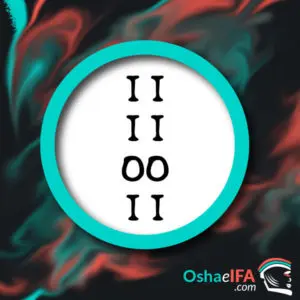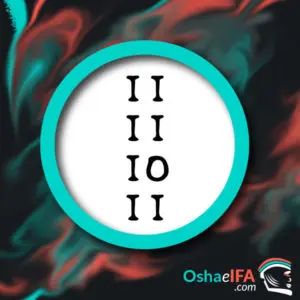Irete Yekun (Ìretè Òyèkú)

Irete Yekun (Ìretè Òyèkú) is Odu number 213 within the Lordly Order of Ifá. This Odu advises symbolic gestures of protection and precaution to promote peace and personal security. It is recommended to pass your hands over your head, from front to back, as a cleansing act to ward off negative influences. Furthermore, it suggests the importance of staying home before sunset to avoid conflict and ensure harmony.
General Analysis of the Odu Ìretè Òyèkú
The Odu Ifá Irete Yekun reveals a profound message of caution and wisdom for those who are governed by this sign. Being an Odu of considerable complexity, it is often associated with severe moral and ethical challenges, where personal conduct plays a critical role in defining an individual's destiny. This Odu emphasizes the importance of maintaining strict moral conduct and avoiding actions that may lead to negative consequences, both spiritually and materially.
Economic Aspects:
In economic terms, Irete Yekun advises prudence and rigor. Dishonest actions or lack of diligence can lead to significant financial losses. The creation of Ebo is suggested, using elements such as rooster, jar of honey, jutía, smoked fish, and corojo butter, to improve economic luck. This Odu also warns about the need to avoid laziness and encourages constant and ethical work as a basis for prosperity.
Health Aspects:
Health in Irete Yekun is threatened mainly by problems related to the spine, such as herniated discs and other deformities. Adherents of this Odu must avoid intense physical exertion and take care of accidents that could severely affect their physical integrity. Recommendations include avoiding carrying weights on the head and performing movements that could cause injuries or neuralgia. In addition, the need to take care of exposure to heights and perform cleansing rituals with specific herbs to improve general health is mentioned.
Religious Aspects:
Religiously, Irete Yekun emphasizes the importance of maintaining a close relationship with the deities, especially Obatalá and Eshu. It is recommended to offer sacrifices and follow specific rituals to appease these Orishas and receive their protection and blessings. This Odu also highlights the power of faith and the importance of pilgrimages and visits to sacred places as acts of devotion that can positively alter the course of an individual's life.
Personal Relationships (Love):
On a personal and loving level, Irete Yekun warns about the risk of serious conflicts and misunderstandings, potentially exacerbated by envy or false testimonies. She is advised to maintain rigorous honesty and avoid situations that may give rise to misjudgments or unnecessary conflict. Nobility and integrity in personal relationships stand out as virtues that can protect and strengthen emotional ties, thus avoiding the disintegration of valuable relationships.
Description and Features:
Names and Aliases:
- Go Yeku,
- Irete Oyekun
- Go Makeleku.
- Go Keleku.
- Ìretè Òyèkú.
What is born in the odu of Ifá Irete Yekun?
- In this Odu no Ebo is made.
- Pass your hands from front to back to ward off the bad.
- Herniated disc, broken spine and deformities of the spinal column.
- Eshu Odara does not eat pepper or almond oil.
- When something bad happens, Ifá is passed through his lerí and it is the true Ituto of Awó; Omiero will water the Ilé.
What does Irete Oyekun talk about?
- That Orula does not otokú anyone.
- That the Awó receives Azojuano and in the courtyard consecrates Ajuagan.
- Have a severe and rigorous moral conduct.
- They bear a false testimony to him.
- Great personalities were buried in temples.
- An Osain is assembled in lerí from Agborán.
- The Arara carry Awán in baskets.
Irete Yekun notes:
- Orunmila defeated the Mayomberos.
- The Orishas, out of envy, declared war on Orunmila.
- Orula is accused of corruption of minors.
- Iku thought that Orunmila's head was the best and went to look for it.
- The world was covered in a layer of dust.
- Irete Makelekun fights with Ogbe Yowo for an Obiní on a drum.
- It cannot be stolen.
- Shango turned into Abita and started spinning around.
- Oya did not eat mutton at the table, because it reminded her of Shango.
- Doing wrong is avoided.
- El Jamo made Ebo.
- Almond oil is given to those who disturb.
- The herbs are: sarsaparilla and adrocana.
You can read: Sign of Ifa Oyekun Birete
Meaning of Odu Irete Yekun:
In this Odu the stories of mythical and spiritual figures are told. Twin brothers Osisu, known for his kindness, and Ajuagan, an evil sorcerer, are central to his tales. Furthermore, the hollow sword of the Peregun, which has its own voice in Irete Yekun, is mentioned, as are the three sorcerer spirits and the two sons of Oluopopo: Sori Bokun, the benevolent, and Tinshomo Awo Ifa, the evil one.
Within this Odu, the secret of Ajuagan is revealed, a Saint Lazarus associated with three sorcerer spirits, known for his danger and his diet of human blood. Although this Odu is considered lucky, bad luck in the form of illness, represented by Arun, constantly stalks him. Irete Makelekun, the central figure of this sign, is also said to be friendless and perpetually haunted by illness.
Furthermore, Irete Yekun is an Odu marked by unhappiness and vulnerability to disbelief, which can have deadly consequences. The babalawo, an Ifá priest, occupies a prominent place, sitting next to Olofin and Orunmila, who direct his actions. During the rituals, the Awó places the Ifá atefon on his head, an act of great spiritual significance.
This sign also warns about the risks of facing elder envy, underscoring the importance of meticulously documenting all actions and decisions to avoid misunderstandings or false accusations. Furthermore, in this sign, mayomberos, practitioners of a form of magic, meet their end, underscoring the intense spiritual struggle inherent to Irete Yekun.
Recommendations:
- Feed Eshu and make sacrifice, raise animals before killing them to save his family.
- Be noble and consistent with others, do not do mischief.
- Have a severe and rigorous moral conduct, avoid delights and treats that can lead to everything in your life being ruined.
- Do Ifá.
- Make Ebo for Ilé with akuko, jar of honey, eku, eyá, epó, opolopo owó.
- Bring Obatalá 4 ataná to the Church.
- Bathe with 4 different herbs to improve your luck.
- Visit abandoned places or churches.
- Give mass to the dead.
- Give chicken to Shango and Elegba.
- Assemble an Osain in Agborán lerí.
- Put flowers on Azojuano.
- Pray the Odu and water Omiero throughout the house with the tail or Iruke of Orunmila and sing: "Mogun Moyoko Nifa Teapot."
- Pass your hands over your head, from front to back, to ward off the bad.
- Take care to attend festivals, parties and drums to avoid fatal outcomes.
- Make Romerías (pilgrimages) to find your luck.
- Bathe with four different herbs to improve luck.
- Make mass for deceased family and friends.
- Respect Saint Lazarus, pay him his debts.
- Visit abandoned churches.
- Works are made with pins by the Bayoneta (Peregun) and the Sarsaparilla.
Prohibitions:
- Do not wear rings.
- Do not do Ebo in this Odu, since it brings many problems and commitments.
- Do not carry weights on your head or make strong efforts that affect the spine.
- Avoid climbing on high places to avoid falling and suffering accidents.
- Take care of the use of rings and others on the hands, which cause conditions such as sepsis.
- Do not trust those who accompany you in the social-productive or other order, because in moments of danger, they leave you alone.
- Don't live where you are, because they destroy you.
- Be careful on a drum so as not to attack someone or vice versa.
- The Awó should not be bothered, especially near Shango.
You can read: Odu of Ifa Irete Meyi
Sayings of Irete Yekun:
- Unbelief costs him his life.
- Death was looking for a head.
- You will be lucky, but ARUN is after you.
- Nobody can cut AJUAGAN, I defend him.
- The one who has no friends.
- I do not do mischief or evil.
- I do good to enemies and friends.
- You don't get arrows without going to the battlefield.
- The egg eater does not think about the work it cost the hen to have it (vague).
The saying "I do good to enemies and friends" underlines the nobility of treating everyone with kindness, regardless of their intentions towards us. This principle encourages generosity of spirit and promotes peace, suggesting that the good we do defines us more than the attitudes we face.
Ethical code:
- The Awó always writes down the steps he does.
Says Ifa odu Irete Yekun:
The person who feels a strong connection with the Saints and enjoys their presence should be cautious, especially when following their instructions without first consulting Orunmila, the only one who does not ride. It is essential to verify with Orunmila any action that the Saints suggest, as it can be crucial to avoid errors or misunderstandings. In addition, it is recommended to be discreet in meetings and public spaces to avoid attracting unwanted attention that could act as a boomerang in his life.
You are lucky enough to be constantly stalked by illnesses; It is vital to hold masses for deceased relatives to preserve their well-being and luck. It is important to solve a big problem that ails you by making use of specific religious practices to avoid future losses. You are also warned about the risk of false testimony and the implications of romantic relationships initiated at events such as drums, which could end in tragedy.
Finally, attend to any outstanding debt to Azojuano (San Lázaro) and be aware of your enemies. Death seems to be around, so it should not be neglected. Wear a gold ring, previously washed and prepared, as a good luck talisman and always be grateful for it, as it represents a symbol of fortune in your life.
Prayer of the Odu Irete Yeku:
Adifafun awere Orunmila, akuko, adie lebo, ofa meta lebo, agbado lebo. Abada bi abada, abada bi abada adifafun wenwele aleticho ma aya lorubo koru oka abenu baba adifafun olososhe umbati owo were aguto biele. Moteyeku oyibire obañari koshetero adifafun iba erilati bogbo unguelode akreke ugue awere ugue awere larubo afofada ayarufo abo lebo.
You can read: Sign of Ifa Irete Ansa
Patakie (stories) of the Irete Oyeku sign:
Orunmila's Test
All the Saints, especially Oshun and Ogun, felt great envy towards Orunmila and decided to complain to Obatalá, who in turn sent for Orunmila with the help of Elegba. Precisely that day, Orunmila had consulted himself in Ifá and was prepared for any eventuality. Upon arriving at Olofin, he found that he was surrounded by all the Saints, each accusing him of being the cause of Humanity's misfortunes. Once everyone had expressed their complaints, Olofin asked Orunmila if he had anything to say. Orunmila responded: “Everything they say about me is a lie, my Father. Every time I work with this okpele or with Ifá, I mark in each Ebo animals such as ounko, akukó, abo, etc., that I do not consume, but that the Saints do eat. In this way, I mark those animals in the Eboses so that the Saints, instead of consuming people, eat those animals.” Thus, Orunmila demonstrated before the eternal father that he, in fact, saved the world from destruction. Impressed by this evidence of intelligence, Olofin absolved him of all accusations.
Explanation: This patakie illustrates the importance of always being prepared and using cunning in dealing with accusations and challenges. Orunmila, by foreseeing problems and preparing properly, was able to successfully defend himself against the unjust accusations of the other Saints. This teaches that, beyond mere innocence, it is essential to be equipped with evidence and arguments that confirm our integrity and positive contribution.
Inheritance and Destiny
Once upon a time there were two brothers who inherited two properties from their father: a house in the country and another in the city. The older brother, a Mayombero, chose the country house to live, while the younger, a devotee of the Saints and Orunmila, stayed in the city. Over time, the minor prospered and his fame grew enormously. On the other hand, the Mayombero, despite his power, faced difficulties and ended up moving to the city, where he displaced his younger brother from the position he had built.
Displaced, the younger brother sought the advice of Orunmila, who performed an Ebo for him and advised him to make a pilgrimage to the countryside. During his pilgrimage, he discovered an abandoned hermitage that hid a treasure and the remains of an Egun. He rescued the treasure and, in a gesture of gratitude, shared part of it with the workers who assisted him and financed the remodeling of the hermitage.
When the owners of the hermitage returned and saw the improvements, but noticed the absence of the treasure, they decided to give the hermitage to the younger brother, since they had no interest in maintaining it. Thanks to his devotion and following Orunmila's advice, the younger brother not only recovered what was lost but also gained a new sanctuary.
Explanation: This Patakie highlights the importance of faith and integrity in life. He shows how, despite adversity and unfair competition, maintaining devotion and following spiritual advice can lead not only to overcoming difficulties but also to obtaining unexpected rewards. Additionally, the act of sharing blessings received with others reinforces the idea that generosity and gratitude can transform adverse situations into opportunities for growth and blessing.
Irete Oyekun Ifa Traditional
ÌRETÈ ÒYÈKÚ
A tè yèlèkú
Ó yí won bìrìpé
A day fún Òrúnmìlà
Babá n sawo lo àjò to jìn gbungbuungbun
Òrúnmìlà ní n bèère
Àjò túun n lo yìí
Òun ríre ibè mú bò?
Wón ní kí Òrúnmìlà ó rbo
Toríi bó bá dè àjò yóó pàdé àwon òtá
Kí wón or lè jé or ríre ibè kó wálé
Won yan Òrúnmìlà léku
Wón yàn an léja
Wón ní kó móo fi were bòkè ìpòrí è
Òrúnmìlà béè
Ó dé àjò tú jìn gbungbuungbun
Àwon òtá féé gbógun tì Í
Bí ón tí n gbóguún tì Í
Béè ni won n báraa woón jiyàn
Ni ón n ba ara won sòtá
Tí Òrúnmìlà ni won se nbè
Òrúnmìlà kóre àjò tú jìn gbungbuungbun
Ó kó o wo inú ilée baba rè wa
N ní wá n jó ní wá n yò
Ní n yin àwon Babaláwo
Àwon Babaláwo n yin Ifá
Ó ní béè làwon Babaláwo tòún wí
A tè yèlèkú
Ó yí won bìrìpé
A day fún Òrúnmìlà
Babá n sawo lo àjò to jìn gbungbuungbun
Wón ní ó saca káalè ó jàre ebo ní ó se
Ó yes gbébo nbè
Ó rubo
Rírú ebo nií gbéni
Àìrú kìí gbèèyàn
Ko pé kò jinna
E wáá báni báyò báre
Ààrin ayò làá bá ni lésèe tÒpè
Ifá wants this person to be well. He is exhorted to make sacrifice so that he can win and that wherever he goes he can succeed.
We step on something flimsy
Falling around
He was the one who made divination for Òrúnmìlà
When he was exercising his priesthood in a distant place
This was únrúnmìlà who asked:
'This journey I'm about to undertake'
'Will I be able to do outstanding things?'
They advised him to offer sacrifice
They said: 'You will meet enemies when you reach your destination'
And so they don't stop you when you're back with your winnings
They prescribed rats for Òrúnmìlà
They prescribed fish for him
They advised him to use them to sacrifice his own Ifá
And Òrúnmìlà did it
When he reached his destination
The enemies decided to declare war on him
They were planning how they would fight him
They were arguing with each other
And they fell out with each other
They acted in favor of Òrúnmìlà in the city
Òrúnmìlà packed all his earnings made in that far away place
He took all his winnings home
And he started dancing and he was happy
He praised his Babaláwos
And their Babaláwos praised Ifá
He said it was exactly as his Babaláwos had said
We step on something flimsy
Falling around
He was the one who made divination for Òrúnmìlà
When he was exercising his priesthood in a distant place
He was advised to care for the land and offer sacrifice
He heard about the sacrifice
And he did
Heeding the warning of sacrifice is what helps one
Refusing to do so does not benefit you
Shortly after in the near future
Come and find us happy in the midst of good fortunes
One usually finds happiness at the feet of Òpè.














